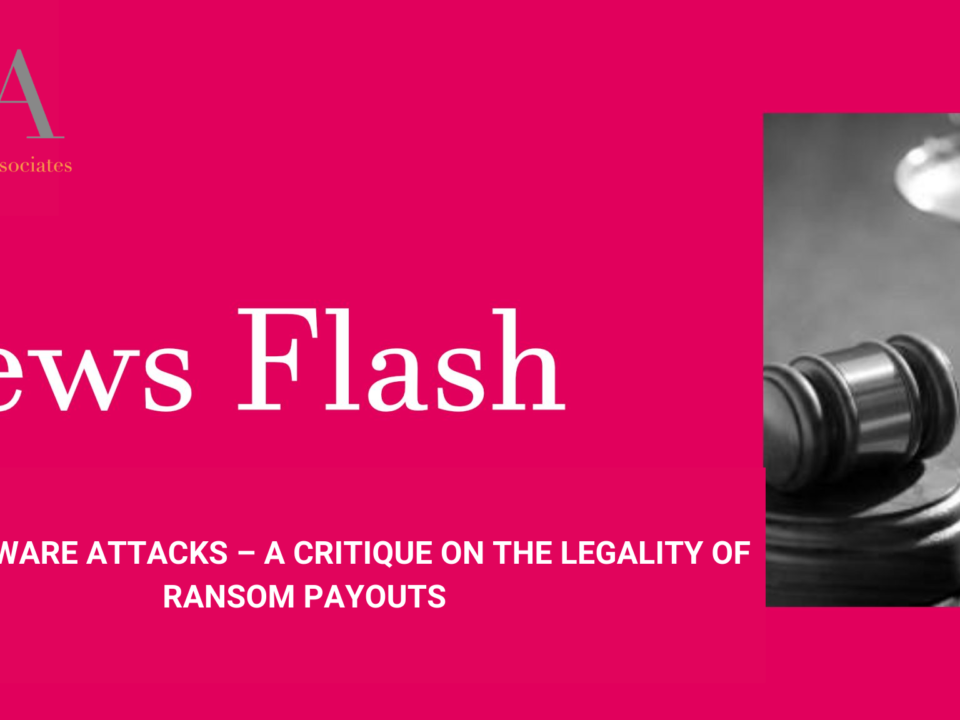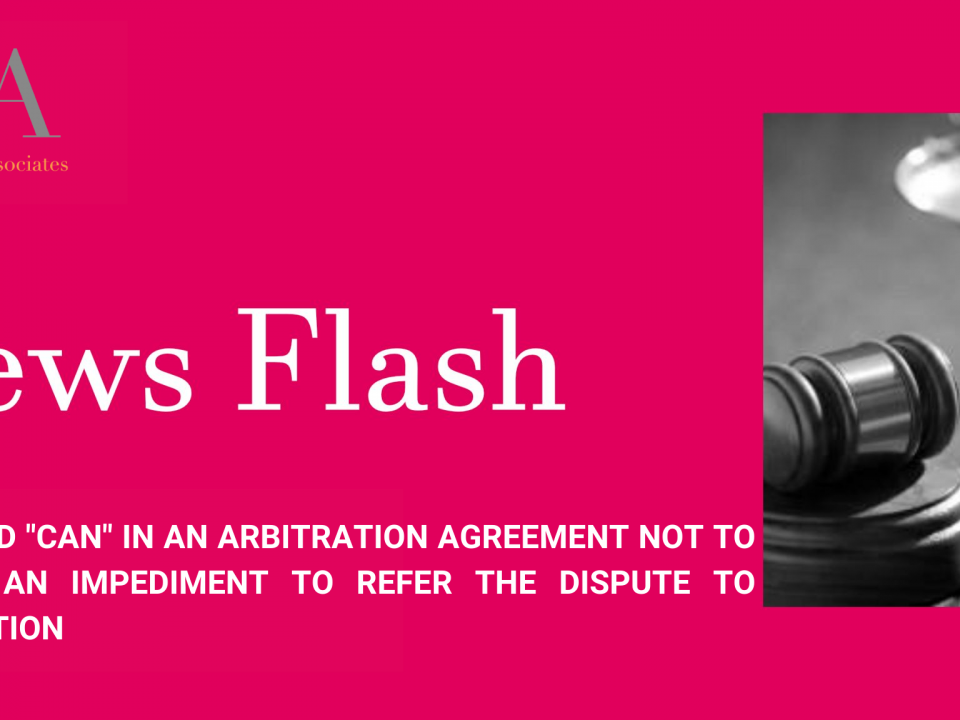
Introduction:
With the outbreak and rapid spread of COVID-19, the Government of India had to implement a nationwide lockdown in the country effective from 24th March, 2020. The activities prohibited across the country include travel by air, rail and road, operation of educational and training institutions, industrial and commercial activities, all cinemas halls, shopping complexes, theatres etc. However, the Home Ministry issued an order delineating a list of activities that will be allowed with effect from 20th April, 2020 viz. movement of cargo activities, farming operations, fisheries, plantations, animal husbandry, commercial and private establishments, constructions, Information Technology, industrial units in SEZs and rural areas and e-commerce operations. This paper deals with some of the legal situations that may impact businesses upon reopening of the mainstream economy and insurance coverage scenarios.
Situation 1: Liability of Employer in the event an employee contracts COVID-19 in the office premise or travelling to the place of work.
A potent threat that faces most businesses is the situation that on reopening of the mainstream economy, one of its employees contracts the COVID-19 virus.
In order to analyze whether an employer can be held liable under such a scenario, one will have to peruse the Employee Compensation Act, 1923 (as amended). On perusal of Section 3 of the Employee Compensation Act, 1923 (as amended), we understand that liability of the employer for compensation is created by the Act if personal injury is caused to an employee by accident arising out of and in the course of employment. Sub-section 2 of Section 3 of the said Act contains deeming provision wherein reference is drawn to occupational diseases in any employment specified in Part A of Schedule III of the Act, diseases contracted in any employment specified in Part B of Schedule III or Part C of Schedule III and injuries sustained or suffered due to these diseases shall be deemed to be an injury in the course of employment. Therefore, in order to determine whether the employer will be liable to pay compensation to an employee, the following requirements under Section 3 of the said Act will have to be satisfied-
i. Personal injury is caused to an employee
ii. Personal Injury is caused by accident and
iii. The accident must have arisen out of and in the course of employment
i. Employee must have sustained ‘Personal Injury’ caused by ‘accident’
Firstly, the coverage of employees under Workmen Compensation Act 1923 has been enlarged after the amendments carried out in 2009. The name of the act now stands to be Employee Compensation Act. The earlier law covered only workmen. Now all employees are covered irrespective of the wages drawn by them provided they belong to the categories mentioned in Schedule II of the Act. Therefore prior to analyzing whether the other conditions are satisfied, it first needs to be determined that employee seeking compensation falls within the ambit of the term ’employee’. Secondly, the terms ‘personal injury’ and ‘accident’ have not been defined under the said Act. Upon perusal of the Judgment of the Hon’ble Gujarat High Court in the matter of Shantaben Thakor vs New Raipur Mills Co. Ltd. on 14 April, 1967, we understand that the term ‘accident’ has to be construed in its popular sense as an unlooked-for mishap and untoward event which is not expected or designed. It has also been pointed out that the statute does not make a distinction between a personal injury and the accident. What the statute intends to convey is what might be expressed as an accidental injury.
In order to understand whether COVID -19 can be considered to fall within the ambit of the term ‘personal injury’ reference is drawn to the following judgments
a. Judgment of the Hon’ble Madras High Court in the matter of The Management vs. H. Jayaline Ramola dated 9th January, 2012 wherein the Hon’ble Madras High Court has inter alia observed that Injury suffered must be a physiological injury.
b. Judgment of the Hon’ble Punjab High Court in the matter of Indian News Chronicle Ltd. v. Mrs. Luis Lazarus A.I.R. 1951 Punj. 102, wherein a workman was under duty as an electrician to go to heating room and from there to a cooling room frequently where the temperature was kept low. While on duty the workman went to the cooling room and thereafter fell ill and subsequently died of pneumonia. In this behalf, the Hon’ble Court held that the ‘injury’ in Section 3 of the Workmen’s Compensation Act does not mean mere physical but may include a strain which causes a chill.
Therefore, from the above, we understand that personal injury need not necessarily be bodily injury and the term personal injury in the said Act is to be given a wider connotation to also include diseases.
ii. The accident must have arisen out of and in the course of employment
Since it is inferred from the above that personal injury not only includes bodily injury but also includes diseases within its ambit, it now needs to be determined whether in the event an employee while travelling to/from his place of work or in his office premises contracted COVID19 can it be said that in such circumstances an employee suffered an injury in an accident arising out of and in the course of employment.
It would be imperative to mention here that the term “in the course of employment” suggests that the injury must be caused during the currency of employment whereas, the term “out of employment” suggests that there must be a causal connection between the employment and the accidental injury caused to the employee.
Scenario A: An Employee contracts COVID-19 in his office premise
In order to understand whether such a scenario can be said to fall within the ambit of the term “in the course of employment” and “arising out of employment”, reference maybe drawn to the judgment of the Hon’ble Supreme court in the matter of Mackinnon. Mackenzie & Co. (P). Ltd. v. Ibrahim Mahammad. Issak [AIR 1970 SC 1906] wherein the Hon’ble Supreme Court has inter alia held that “To come within the Act the injury by accident must arise both out of and in the course of employment. The words in the course of the employment mean in the course of the work which the workman is employed to do and which is incidental to it. The words arising out of employment are understood to mean that during the course of the employment, injury has resulted from some risk incidental to the duties of the service, which, unless engaged in the duty owing to the master, it is reasonable to believe the workman would not otherwise have suffered. In other words there must be a causal relationship between the accident and the employment. The expression arising out of employment is again not confined to the mere nature of the employment. The expression applies to employment as such to its nature, its conditions, its
obligations and its incidents. If by reason of any of those factors the workman is brought within the zone of special danger the injury would be one which arises out of employment. To put it differently if the accident had occurred on account of a risk which is an incident of the employment, the claim for compensation must succeed, unless of course the workman has exposed himself to an added peril by his own imprudent act.”
Further, reference is also drawn to the judgment of the Hon’ble Bombay High Court in the matter of Bhagubai v. Central Railway [A.I.R. 1955 Bom. 105], wherein the Hon’ble Bombay High Court has inter alia held that, “…if the employee in the course of his employment has to be in a particular place and by reason of his being in that particular place he has to face a peril and the accident is caused by reason of that peril which he has to face, then a causal connection is established between the accident and the employment. It is now well settled that the fact that the employee shares that peril with other members of the public is an irrelevant consideration. It is true that the peril which he faces must not be something personal to him; the peril must be incidental to his employment. It is also clear that he must not by his own act add to the peril or extend the peril. But if the peril which he faces has nothing to do with his own action or his own conduct, but it is a peril which would have been faced by any other employee or any other member of the public, then if the accident arises out of such peril, a causal connection is established between the employment and the accident…..”
Furthermore, reference may be drawn to the Judgment of the Hon’ble Supreme Court in the matter of Jyothi Ademma vs. Plant Engineer 2006 (4) MLJ 154 (SC) wherein the Hon’ble Supreme Court held that, “Under Section 3(1) it has to be established that there was some causal connection between the death of the workman and his employment. If the workman dies as a natural result of the disease which he was suffering or while suffering from a particular disease he dies of that disease as a result of wear and tear of the employment, no liability would be fixed upon the employer. But if the employment is a contributory cause or has accelerated the death, or if the death was due not only to the disease but also the disease coupled with the employment, then it can be said that the death arose out of the employment and the employer would be liable.”
CONCLUSION:
In light of the aforestated, it can be said that upon reopening of business, if an employee contracts COVID -19 during his employment at his office premise, it can be said that such injury was caused in the course of employment and arising out of employment because he was in a place where he contracted the disease by reason of his employment and hence, it can be said that there is connection between the employment and accident.
Scenario B: Contracting COVID-19 to/from work
In order to deal with the said scenario, we will have to first understand the concept of notional extension. Though the said Act does not deal with the concept of notional extension, there are various judicial pronouncements which explain the same. On perusal of some of the judicial pronouncements, we understand that as a well settled rule, the employment of an employee normally does not commence until he has reached the place of employment and does not continue when he has left the place of employment. The journey to and from the place of employment is excluded. It is also a well settled rule that when an employee is on a public road or a public place or on a public transport he is there as any other member of the public and is not there in the course of his employment unless the very nature of his employment makes it necessary for him to be there. However, this is subject to the theory of notional extension, which states that in the event any accident occurs to an employee during his journey to and from the place of his employment, in order to determine whether such an employee would be entitled for compensation, the theory of notional extension would be applied i.e. to include the area which the employee passes and repasses in going to and leaving the actual place of work.
The theory of notional extension will be applicable when there is sufficient evidence to prove that an injury is caused to the employee by an accident “arising out of” and “in the course of his employment”.
This aspect is dealt with in the judgment of the Hon’ble Supreme Court in the matter of . Abida Khatun vs General Manager, Diesel wherein it is observed that “There can be no doubt that the course of employment cannot be limited to the time or place of the specific work which the workmen is employed to do. It does not necessarily end when the ‘down tool’ signal is given, or when the actual workshop where he is working is left”. In other words the employment may run on its course by its own momentum beyond the actual stopping place. Further, in the said judgment, the Hon’ble Court, whilst explaining “an area which the workman passes and repasses in going to and in leaving the actual place of work” has observed that the area does not mean the route covered necessarily in his trip from his house to the place of employment or on his way back from the place of employment to the house. This expression means such areas which the employee had to pass as a matter of necessity and only in his capacity as employee. Such areas would be areas lying between the place of employment and the public place or the public road up to which any member of the public can reach or use at any time he likes. Such areas then would be areas which the employees had, as a matter of necessity, to pass and re-pass on his way to and from the place of employment, and will either be areas belonging to the employer or areas belonging to a third person from whom the employer had obtained permission for the use of that area by his employees. The passing and re-passing over such areas is a matter of necessity as it is presumed, in this context, that without passing over such land or such area, the employee could not have reached the place of his employment. It is in that context that the area of the place of employment is extended to include such areas over which the employee had, as a matter of necessity, to pass and re-pass. Further, the Hon’ble Supreme Court is also of the view that the term “unless the very nature of his employment makes it necessary for him to be there” contemplates the duties of the employee which makes it necessary for the employee to use the public road or public place or public transport in the discharge of his duty.
In this behalf, reference is drawn to the judgment of the Hon’ble Allahabad High Court in the matter of Mst. Abida Khatun vs General Manager, Diesel (1973) ILLJ 387 All wherein it is observed that firstly, the accident must arise out of and in course of the employment. Secondly, the expression “arising out of employment” is not confined to the mere nature of the employment. It applies to the employment as such to its nature, its conditions, its obligations, its incidents. Thirdly, if a workman, in order to get to the actual place of work, had to enter and leave premises or areas on which otherwise he had no right to be and no reason for being, and, if an accident happens while the workman is so trying to get to his actual place of work, it is related to the employment, because it was part of his duty both to go to and to proceed from the work which he is employed to do. It is also observed that the term “going to” or “coming from” would mean that the course of employment runs till the place or area where the workman has no right to be and no reason for being except because of the conditions of his employment. The course of employment includes, apart from the actual work-place, such places or areas which the employer provides or controls to facilitate the ingress or egress of his workmen. The Hon’ble Court also observed that in the event the employee was going on the habitual route, the accident at such a place would be in the course of employment. Further, it is observed that in order to determine the liability of the employer, a condition precedent to such liability is a causal connection or association between the employment and the injury caused by the accident. If after looking at the whole body of facts it can be drawn as a fair inference and without overnice conjectures that an act done in carrying out the condition of the employment caused the accidental injury, the employer would be liable for paying compensation.
In light of the above referred judgments, if the employee establishes that the route vide which he contracted the disease was his customary route that he was required to take to get to his place of employment, then under the notional theory such a claim may be included.
CONCLUSION:
In light of the aforestated in order to hold the employer liable under the said Act, the factors which will have to be considered are the nature of work of the employee and the circumstances in which the infection was caused in order to demonstrate the nexus between employment and injury sustained. Accordingly, the employer’s liability for a COVID- 19 claim will have to be evaluated on a case to case basis.
We now proceed to analyse whether the Workmen Compensation Insurance Policy or CGL Policy will get triggered in the event the Employer is held liable under the said Act.
Exposure under Workmen Compensation Insurance Policy and CGL Policy:
a. Workmen Compensation Insurance Policy:
The claim for reimbursement of compensation will be admissible under such policy in the event it is established that personal injury is caused to the employee of the Insured.
b. CGL Policy:
The said policy is triggered when a claim for bodily injury is made against the Insured. However, the said Policy excludes any bodily injury to an employee of the Insured arising out and in the course of employment
Exposure under D&O cover:
In the event of legal proceedings being initiated on account of injury caused to an employee, where the directors and officers of the company are also made a party to such proceedings on the pretext of their designation in the Company, would the Directors and Officers of the Company be entitled to make a claim under the D&O cover only for the limited purpose for seeking reimbursement of the legal costs incurred in defending such a litigation is the next aspect to be considered.
Firstly, for the Policy to get triggered, one needs to determine whether the allegation made in the legal proceedings against the director or officers falls within the ambit of the term ‘Wrongful Act’ under the Policy. Secondly, it needs to be determined whether the amount sought to be indemnified by the Insurer falls within the ambit of the term ‘Loss’. The term ‘Loss’ in a D&O cover usually covers Defence costs within its ambit. However, most D&O covers do not cover ‘Loss’ arising out of a Claim made against the directors and officers for bodily injury, sickness, disease or death of any person. In our view, claim for reimbursement of defence costs in the present scenario will be excluded since the proceeding initiated against the director and officers was on account of the bodily injury sustained by the employee. However, this will need to be considered on a case to case basis depending on the wording of the policy issued.
Situation 2: Economic effect of COVID 19 on contracts
Some of the legal threats that businesses may face are as follows:
i. Contractual obligations entered into by a company before the outbreak of the pandemic, however, on account of the implementation of the lockdown, the contractual obligation could not be fulfilled;
ii. A company already suffering through a financial crisis and the outbreak of COVID-19 merely acts as a catalyst to an event of contractual default.
In such a scenario, Companies might notify a claim under a All Risk Policy for seeking indemnification in respect of the Loss of Gross Profit. Most of the business interruption clauses inter alia state that the Insurer will indemnify the Insured in respect of Loss of Gross Profit if the Loss actually sustained during the Policy Period resulted from reduction of turnover due to interruption of business due to loss/damage to any property/assets insured. Consequently, we understand that the property so insured should be physically damaged on account of the perils covered under the Policy. Since the current pandemic is a virus outbreak, such virus will not be covered as a peril under such policies issued. Therefore, such claim for indemnification of Loss of Gross Profit on account of non-fulfillment of contractual obligation will not be covered under the Policy. Also, claim with respect to financial loss already suffered by the company and COVID-19 merely acting as a catalyst will not be covered since it does not fulfill the criteria of property being ‘physically damaged’ and such situation falling within the perils mentioned under the policy.
In such a situation, we must also highlight the concepts of ‘Force Majeure’ and ‘frustration of a contract’, since there appears to be quite a lot of confusion on this aspect. A force majeure clause provides temporary reprieve to a party from performing its obligations under a contract upon occurrence of a force majeure event. In order to invoke a force majeure clause, the event so occurred should form part of the list of events defined as a force majeure event. However, if a contract does not contain such Force Majeure Clause, the parties will have to ascertain whether Section 56 of the Indian Contract Act, 1872 gets triggered. The Doctrine of frustration is envisaged in Section 56 which states that an agreement to do an act impossible in itself is void. Therefore, in order to do understand the concept of “impossible” one will have to refer to the Judgment of the Hon’ble Supreme Court in the matter of Energy Watchdog vs Central Electricity Regulatory Commission, wherein the Hon’ble Supreme Court has drawn reference to the judgment of the Hon’ble Supreme Court in the matter of Satyabrata Ghose v. Mugneeram Bangur & Co., 1954 SCR 310, which inter alia states that “What was held was that the word impossible has not been used in the Section in the sense of physical or literal impossibility. The performance of an act may not be literally impossible but it may be impracticable and useless from the point of view of the object and purpose of the parties. If an untoward event or change of circumstance totally upsets the very foundation upon which the parties entered their agreement, it can be said that the promisor finds it impossible to do the act which he had promised to do. It was further held that where the Court finds that the contract itself either impliedly or expressly contains a term, according to which performance would stand discharged under certain circumstances, the dissolution of the contract would take place under the terms of the contract itself and such cases would be dealt with under Section 32 of the Act. If, however, frustration is to take place de hors the contract, it will be governed by Section 56.” Therefore, in order to determine whether a contract is governed by a force majuere clause or is completely frustrated, it would be imperative to not only consider the wording of the force majuere clause to see whether the provisions of force majuere clause could be said to be attracted, but also whether the act so promised to be performed has now become impracticable and useless from the point of the view of the parties entering into a contract after the lockdown has been lifted and consequently that the performance of the contract is completely frustrated.
If you have any clarification, please get in touch with Adv. Mr. Burzin Somandy on his email idburzin@somandyassociates.com. This newsflash is not meant to be considered as a legal opinion but is meant only for information purpose.
Somandy & Associates Advocates
409, Commerce House
Nagindas Master Road
Fort, Mumbai – 400023.



